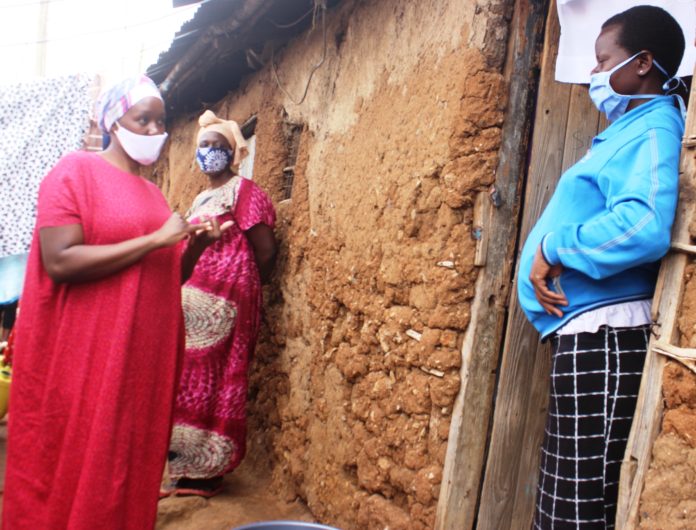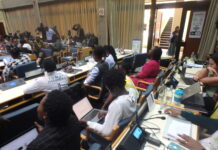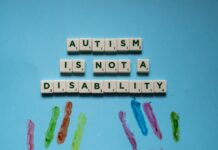By Lilian Museka
Nairobi, Kenya: After a daily routine briefing with their supervisor at Amani Kibera Centre, a youth-led organization empowering the youth, Salome Njeri and Anisa Angulu set out to do a job many would shun off; visiting homes in the sprawling slums of Lindi Area of Kibra slum, one considered to be the largest urban slum in Africa.
As cases of Covid-19 continue to rise and with the government trying to effect the stay at home, sanitize and maintain social distance rules, it is seemingly becoming difficult for residents in this area to abide by the regulations due to congestion and the crumped up shanties.
This however does not deter the two Community Health Volunteers( CHVs) as they maneuver through the open sewer lines reaching out to residents to talk to them about Covid-19, how to wash hands, don a mask, and other self-care regulations.
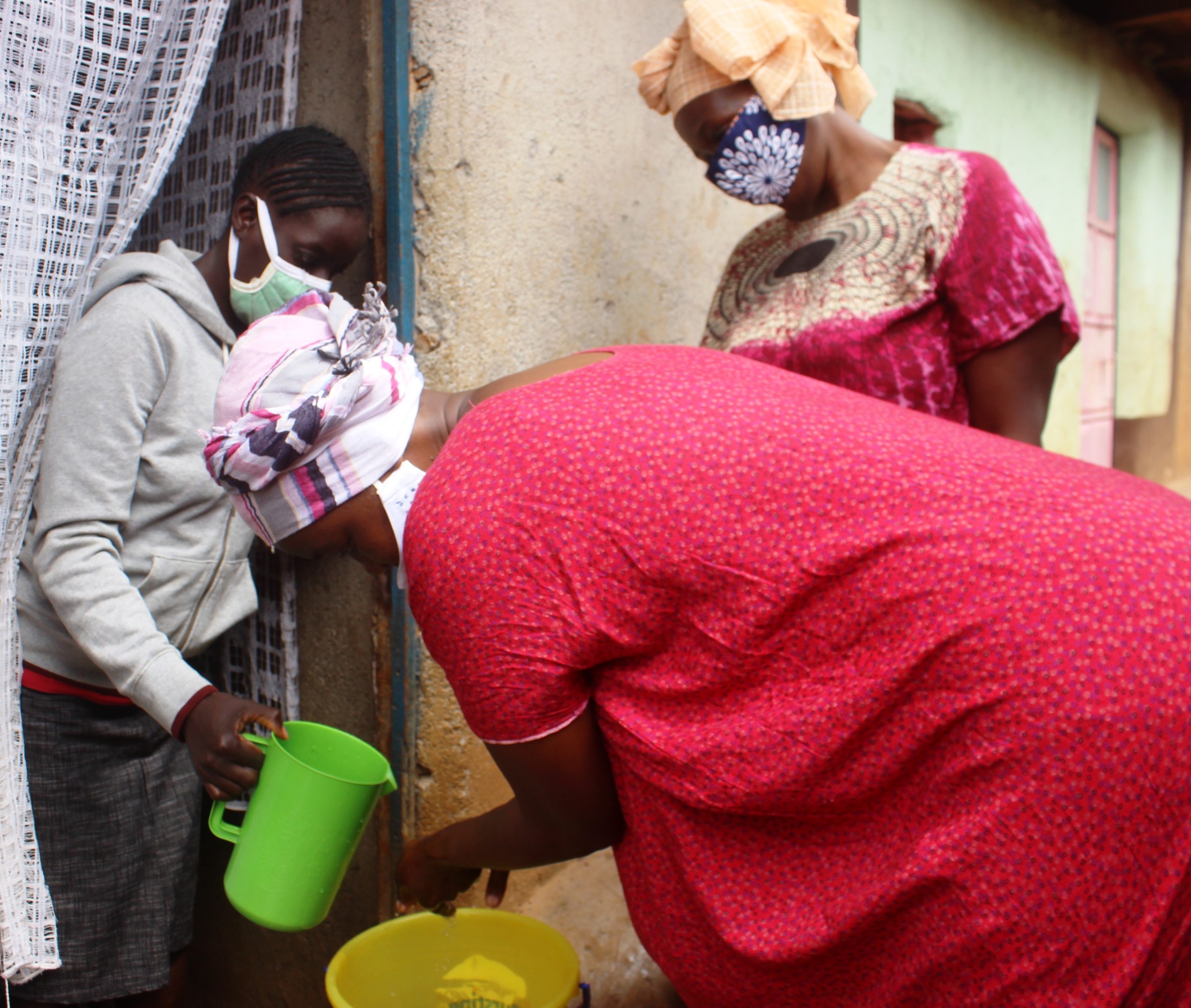
“It is very risky in this area as residents hardly obey the set rules and regulations. One can easily contract the virus. However, my conscience does not allow me to stop preaching the gospel of Stay Safe’ until I see change,” says Njeri who is now surrounded by a crowd of children that unfortunately have no masks and social distance is still foreign to them.
“If one person contracts the virus, then you can be sure it will be a matter of time before the rest catch it! The situation here is as dire as you can see; how dense the population is and the proximity of houses. Also, residents are yet to accept that COVID- 19 is real. They say that it is for the ‘rich’. Some insist on hand greeting or hugging and if you refuse, they won’t listen to you. But we just have to keep on educating them.” She adds.
The two are among the 70 Unsung CHVs in the Lindi area, with no medical background but determined to battle the virus in their community. Armed with a two-week training from the county government, they move from one household to another three to four times a week, concentrating on the most vulnerable who include those with underlying illness, pregnant mothers, and children with special needs.
Today, the two have lined up four visits targeting the vulnerable. Njeri is in charge of Lindi A while Angulu is in charge of Lindi B. They have been traversing the area for the last two years educating residents on other diseases and cleanliness. This time, they have acquired new skills to address the emerging challenges of Covid-19. This journalist accompanies accompany them to see how their day is spent with their clients.
The first stop is at the house of 35-year-old Khadija Kubasu, a mother of two living with HIV. Ms. Kubasu has been in denial since 2015, a situation that forced a children’s home to forcefully take away her eldest son. “I was self-stigmatized, I refused to take medication and even care for my child who unfortunately had contracted the virus from me. He’s now at a children’s home.” She says.
Njeri explains that they have been on her case for the last two years, counseling and accompanying her for medical checkups, treatment, and ensuring that she continues getting a steady supply of antiretroviral drugs.
“She has improved greatly since she accepted her condition. Despite Covid-19 affecting the accessibility of drugs, through other partners, we have ensured that she never misses her dosses.
During the July 24th COVID- 19 briefing, Health Chief Administrative Secretary Dr. Mercy Mwangangi indicated that the rate of HIV/AIDS infection had drastically reduced during Covid-19 but feared that the pandemic may drastically reduce the number of clients being identified adding that community testing for HIV has also reduced by 71 pc despite the services still being available. Most patients are shying away from visiting health facilities due to Covid-19. Njeri says that they will continuously ensure that Khadija gets her supplies despite the challenges.
Their second visit is to Dorcas, an expectant mother. They evaluate her progress on clinical visits, challenges in her pregnancy, and offer advice on self-care during this period of Covid-19. The third visit is another expectant lady who however is not comfortable with the presence of journalists. The CHVs are forced to converse with her privately
On their last visit for the day; the two Community Health Volunteers visit Beryl, a mother taking care of a 24-year-old son suffering from Cerebral palsy.
“He has had this condition since he was born. He has never uttered a word or walked. It is a challenging condition that needs constant checkups and healthy eating. Unfortunately, I lost my job due to the current pandemic and it has not been easy taking care of him,” Beryl tells us adding that she is grateful that the CHVs have introduced her to several relief organizations that have ensured she has access to medication and food.
Beryl’s challenge now is paying rent and getting someone who can take care of her son because she has since losing her job improvised on a new income-generating activity which is preparing mandazis for sale. “Right now, no one will give you a job, not even washing clothes. All our employers are scared so we have to find survival means. This single room goes for Ksh.3,000. I have to pay for it, buy water and ensure all our other needs are met. So I can’t just stay at home” She adds.
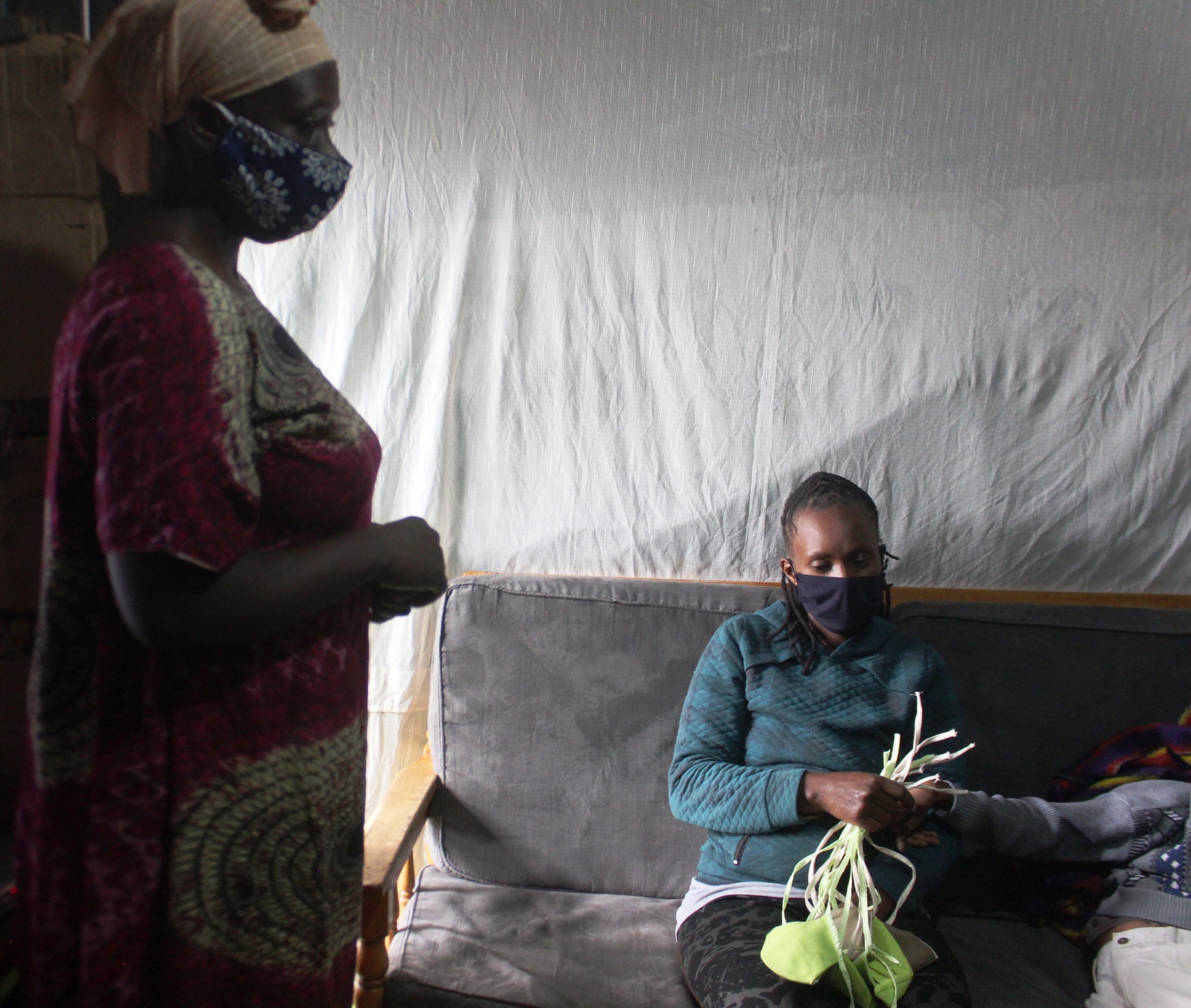
In all their visits, the CHVs are armed with masks, which they distribute according to the number of family members they visit and they also demonstrate proper handwashing methods, among other safety measures.
“Unfortunately, masks are the only thing we have now. We have partnered with Amani Kibera that locally produces masks by rescued girls from early marriages and those who have dropped out of school and have undergone training. “ says Angulu.
Mariam Twahir, the Girls coordinator for the Uwezo training program at Amani Kibera says they have so far produced 7,000 masks which they have distributed. The organization relies on crowdfunding to meet the costs. They are currently making children’s masks which will be distributed once finished. “We are targeting 20,000 masks for the children as nobody is thinking about them.” Says Twahir.
Angulu says partners like Amani Kibera have come in handy as most times they hardly get supplies from the government. “This is a major challenge because when you go to the community, they are expecting you to supply them with masks and hand sanitizers which most times we don’t have.”
Asked how the government plans to partner with the CHVs during the daily briefings, Health CAS Dr. Mercy Mwangangi said the government is working in partnership with the already trained 59,000 CHVs deployed around the 47 counties at a time when the focus shifts to Home Based Care.
She said the government is refocusing to strengthen community engagement and structures are being put in place in collaboration with the county governments.
As the transmission continues to be on the upsurge, CHVs like Njeri and Angulu are becoming very essential in the war against the pandemic.
“We have successfully handled such cases as domestic violence where we have managed to reconcile families, empowered young people on teenage pregnancies, counseled patients who have faced stigma due to underlying conditions, among other issues. In the current situation, we have taken the role of community educators and also providers of masks and hand sanitizers which we get from different partners” Says Njeri.
Mr. Jonah Kabole, a Community Health Committee (CHC) supervisor says CHVs are locally sourced and are very acquainted with the terrain where they work. They are therefore very essential in providing home-based care, contact tracing, and empowering members on self-health care. They have also been dealing with other conditions like HIV/AIDS, Malaria, and other outbreaks.
Earlier in May, the government had considered locking down the Kibera slums after COVID-19 positive cases in the area shot up during the first two months of the pandemic hitting the country.
With the positive cases standing at 151 by the end of May, the government was still hesitant to affect the move in an area that has water challenges and which is densely populated. Figures released by the government from the 2019 population census indicate that the slum has a population of 185,777 people.
With the country reporting increased cases of infection which now stand at 17,603 (July 26th figures), densely populated slums, poor access to water, weak health care systems, and other diseases may play a hand in an increase in those figures in the near future.
In May, the World Health Organization had warned that up to 190 000 people in Africa could die of COVID-19 and 29 million to 44 million could get infected in the first year of the pandemic if containment measures fail.
Currently, Kenya lies seventh in the continent with most cases behind South Africa (which has over 408,000), Egypt (over 90,000), Ghana (close to 30,000). Others like Algeria, Morocco, and Cameroon have over 25,000; 18,000; 16,000 confirmed cases respectively. The country is also the most impacted in the Eastern Africa region.
Kabole says it will require concerted efforts from the government and the CHVs to help educate the slum dwellers to avert the seemingly awaiting disaster adding that they are the first response in the community in the event of any emergency.
“Currently, our CHVs are ill-equipped, no provision of masks, hand sanitizers, First Aid equipment, and security that even in times of emergencies, they have to seek help from partner organizations. The fact that they are also not remunerated makes it hard for their operation as most times they have to use their own resources.
The Secretary-General of Community Health Services and Development Officers Association Mr. Wyclif Ogenya is in agreement with Kabole adding that despite the government having announced donations from various, quarters, they have not been supplied with any. On remuneration, he however says that CHVs are not government staff and therefore there is no provision of remuneration. “Government employs community health assistants who supervise the CHVs. Unfortunately, it’s only the health assistants that are remunerated.”
However, speaking on phone, the Nairobi County Community Health Strategic Co-ordinator Ms. Judy Wairuko says CHVs are trained and provided with the necessary equipment by both the government and partner organizations.
She adds that CHVs have been getting allowances from partners and look forward to the passing of the Nairobi City County Community Health Bill 2019 which among others, recommends training and remuneration of CHVs. Wairuko says the Bill will see the 7,320 CHVs in Nairobi County officially recognized. “
Meanwhile, as we head back to the Amani Kibera Centre which is their meeting point, the two CHVs have to keep stopping to talk to the crowds that are running after them asking for masks and further advice on preventive measures. Residents recognize the two as their as heroines
It has been a busy day for Njeri and Angulu but they are optimistic that despite the continuous challenges, their work of empowerment will bear fruits and eventually reduce the rate of infection in the community. They have become the front- liners to fight the pandemic and need recognition.
“We have to finish by noon or 1 pm so that we can also take care of our other businesses. We are not paid and we have to find a means of survival. If the government would consider something like an allowance for us, it would give us an opportunity to commit more time to this. However, we take up the challenge because we count it as our contribution in trying to better up our community.” concludes Njeri.

